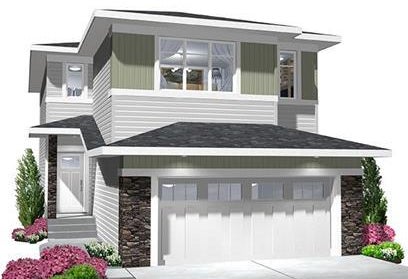Buying a Home in Edmonton
Whether you’re a seasoned home buyer or looking to purchase your first home, we’re here to help you make the best decision possible. Here’s what you need to know about buying a home in Edmonton, Alberta.
Content:
- Understanding Edmonton's Real Estate Market
- Setting A Budget
- Financing You New Home
- Determining Home Wants & Needs
- Choosing The Right Neighbourhood
- Choosing Your Real Estate Agent
- Viewings & Offers
- Closing
Understanding Edmonton’s Real Estate Market
Understanding the Edmonton real estate market can significantly impact your buying decisions. Considering these key factors ahead of time will help you navigate the process:
Market Trends and Pricing: Supply and demand, economic conditions, and interest rates greatly influence current market trends and pricing. Staying up to date with the latest information and working alongside an experienced Edmonton REALTOR® can provide valuable information about Edmonton market trends.
Neighbourhoods and Amenities: From the hustle and bustle of the downtown core to the city’s peaceful suburbs, for example taking a look at the homes for sale west edmonton, there’s something for everyone in Edmonton. Researching important community elements such as transportation, schools, recreational facilities, and other amenities will help you find the perfect community for your new home.
Working with an Edmonton Real Estate Professional: The expertise of a knowledgeable real estate agent is invaluable when it comes to navigating the Edmonton market. Partnering with a trusted real estate professional can provide you with insights, access to listings, negotiation power, and guidance throughout the buying process.
Setting A Budget
Now that you’ve familiarized yourself with the Edmonton market, the next step is determining your new home budget:
Assess Your Financial Situation: Start by evaluating your finances. Take into account your monthly income, expenses, debts, and savings to give you a clear picture of how much you can comfortably afford.
Account for Down Payment and Closing Costs: 5% is the minimum down payment requirement for a home in Canada. Additionally, you’ll need to factor in closing costs, which generally range from 2% to 5% of the home’s value.
Calculate Monthly Mortgage Payments: Use an online mortgage calculator to determine your monthly mortgage payments. You’ll also want to consider interest rates, loan terms, property taxes and insurance.
Evaluate Future Expenses: Additional expenses such as maintenance, utilities, and potential renovations should also be factored in.
Financing Your New Home
Securing your home financing before searching for a new home is vital if you want to save time and money and be taken more seriously by home sellers:
Explore Mortgage Options: Speak with multiple lenders or mortgage brokers to compare interest rates, terms, and down payment requirements. Consider different mortgage types, such as fixed or adjustable-rate mortgages, to find one that suits your financial goals.
Down Payment Assistance: Saving for a down payment can be a significant hurdle for many first-time home buyers. Look into options for first-time home buyer programs, which can help bridge the gap between your savings and the required down payment.
Consult with a Financial Advisor: Navigating the complexities of home financing can be challenging. Consider seeking guidance from a financial advisor to ensure you make informed decisions based on your unique financial situation.
Determining Your New Home Wants and Needs
Identify essential features, such as number of bedrooms, bathrooms or a garage, vs. those that are nice to have, but aren’t critical. Be sure to take the following into account:
Your Lifestyle: Besides the number of bedrooms and bathrooms, consider other specific features such as a home office, large backyard or finished basement. Remember your future needs, especially if you plan to grow your family.
Location and Neighbourhood: Consider neighbourhood characteristics that align with your lifestyle, such as schools, healthcare facilities, grocery stores, and transportation options. You can search through and learn more about Edmonton MLS® listings to determine where in the city you would like to live.
Budget and Affordability: Here again, determine the price range that aligns with your affordability as well as additional costs such as property taxes, maintenance, and insurance.
Choosing the Right Neighbourhood
Finding the perfect community to call home is critical to ensuring your current and future happiness. Here are a few factors to consider:
Lifestyle and Amenities: Think about your lifestyle and what amenities matter most to you, such as schools, healthcare facilities, parks, shopping, and entertainment. For example, if you like being active, prioritize neighbourhoods with accessible outdoor areas and walking trails take a look at Houses For Sale Southwest Edmonton.
Safety and Security: Safety is a prime concern for any home buyer. Research each neighbourhood’s crime rates and overall reputation for safety. You can also ask your Edmonton REALTOR® and/or residents for more information.
Transportation and Accessibility: Consider public transit, major highways, and commuting distance to work. Accessibility to amenities, including grocery stores, banks, and healthcare facilities, also ensures a convenient lifestyle.
Future Development: Investigate any planned or ongoing developments in the neighbourhoods you are considering. New infrastructure projects, commercial growth, or revitalization initiatives can significantly impact property values and quality of life.
Choosing the Right Edmonton Real Estate Agent
A reputable real estate agent is invaluable when navigating the home-buying process. Here’s what to look for:
Experience in the Edmonton Real Estate Market: Local knowledge is vital as it ensures they are well-versed in neighbourhoods, market conditions, pricing trends, and upcoming developments.
A Great Track Record: Positive reviews and recommendations from past clients show a high level of professionalism and customer satisfaction.
Communication and Availability: Look for someone who promptly responds to your questions, listens to your concerns, and keeps you informed throughout the process.
Negotiation Skills: A good real estate agent should possess excellent negotiation skills. They should be adept at advocating for your interests, securing the best possible price, and navigating negotiations.
A Professional Network: Well-connected agents, such as mortgage brokers, home inspectors, or lawyers, can provide additional resources and expertise when needed, which can streamline the home-buying process.
Viewing Properties and Making an Offer
Once you have shortlisted potential properties, it’s time to schedule showings and, eventually, make an offer:
Viewing Properties:
- Schedule Appointments: Work closely with your real estate agent to arrange appointments to view properties.
- Take Notes and Pictures: These will be helpful for future comparisons, as well as for consulting with family, friends, or your agent.
- Assess the Condition: Pay attention to the condition of the property, including its functionality, repairs needed, and potential upgrades.
Making an Offer:
- Consult With Your Agent: Rely on the expertise of your real estate agent when preparing your offer.
- Include Contingencies: Consider including financing and home inspection in your offer. This protects you from unforeseen circumstances and allows you to negotiate.
- Schedule a Home Inspection: Hiring a licensed home inspector will help identify any hidden issues or repairs needed.
Completing the Closing Process
Once you have found your dream property, there are a few steps involved in completing the closing process:
Work With a Real Estate Lawyer: They will review the purchase agreement, handle the necessary legal paperwork, and ensure the title is transferred correctly.
Conduct a Final Walkthrough: Verify that all requested repairs have been completed and the fixtures and appliances are functioning properly.
Secure Financing and Insurance: Before closing, secure your financing by providing the required documentation to your lender.
Closing Day: Ensure all terms and conditions are accurate and pay any necessary funds to complete the transaction.
Title Transfer and Registration: Following closing, your lawyer will facilitate the transfer of the property title into your name.
Moving In
Plan your move, hire professional movers if required, and notify utility providers about your change of address. Congratulations on the purchase of your new home!






